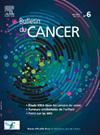Chirurgie prophylactique et oncogénétique : quel impact de l’intelligence artificielle ?
IF 1.1
4区 医学
Q4 ONCOLOGY
引用次数: 0
Abstract
Dans le domaine des prédispositions au cancer, certaines situations peuvent faire discuter une chirurgie préventive. Cet acte est rarement strictement recommandé et repose sur un choix de la personne concernée. Elle doit alors établir une balance entre les avantages et les inconvénients. L’avantage prépondérant de la chirurgie prophylactique est évidemment la réduction du risque. L’estimation de ce risque à l’échelon individuel est actuellement réalisée à l’aide d’instruments « classiques ». Il est attendu de l’intelligence artificielle qu’elle permette de mieux sélectionner les informations génétiques utiles, de mieux classer les variants de signification, de mieux combiner des résultats d’analyses plus larges, et d’apporter la capacité de les associer à des caractéristiques non génétiques. L’intelligence artificielle pourrait aussi aider à faciliter l’accès des personnes à une démarche de génétique, voire contribuer à l’information directe du patient. Ce dernier point nécessitera probablement une vigilance importante.
In the area of cancer predisposition, certain situations may lead to the discussion of prophylactic surgery. This is rarely strictly recommended and depends on the patient's choice. The advantages and disadvantages must be weighed up. The main advantage of prophylactic surgery is obviously risk reduction. At present, this risk is assessed on an individual basis using “classical” instruments. Artificial intelligence is expected to improve the selection of useful genetic information, the classification of variants of unknown significance, the combination of more comprehensive analysis results and the ability to associate them with non-genetic features. Artificial intelligence could also help to make genetic testing more accessible to people, or even contribute to direct patient information. This last point is likely to require considerable vigilance.
求助全文
约1分钟内获得全文
求助全文
来源期刊

Bulletin Du Cancer
医学-肿瘤学
CiteScore
1.90
自引率
16.70%
发文量
224
审稿时长
37 days
期刊介绍:
Without doubt, the ''Bulletin du Cancer'' is the French language publication of reference in the field of cancerology. Official organ of the French Society of Cancer, this journal covers all the information available, whether in the form of original articles or review articles, but also clinical cases and letters to the editor, including various disciplines as onco-hematology, solids tumors, medical oncology, pharmacology, epidemiology, biology as well as fundamental research in cancerology. The journal proposes a clinical and therapeutic approach of high scientific standard and regular updates in knowledge are thus made possible. Articles can be submitted in French or English.
 求助内容:
求助内容: 应助结果提醒方式:
应助结果提醒方式:


